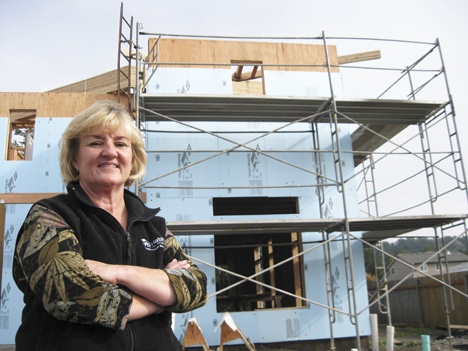One look at the two-story home in its quiet Pacific neighborhood sparks Diane Gallegos’ memory.
There’s some unfinished business.
“We’re staying on schedule, but we just need to keep the push on … for volunteers,” said Gallegos, chief operating officer for Habitat for Humanity of Seattle/South King County. “As you can see, more work needs to be done here.”
Two homes – one a single-story, 1,100-square-foot abode, the other a two-story, 14,000-square-foot model – share a lot along Pacific Avenue South. Despite the generosity of sponsors, volunteer labor and donated supplies, the homes have not been completed.
The call for more help has been made.
The plan is to finish the single-story home by the end of the month, the other by March, at which time Habitat for Humanity plans to break ground on another project in the city. The organization plans to build nine more single-family units on a site it purchased at Meagan’s Meadow at Skinner Road and 1st Avenue East.
The Pacific projects were made possible through Habitat for Humanity of Seattle/South King County – a nonprofit, ecumenical Christian housing organization that works in partnership with volunteers and supporters to build decent, affordable homes for needy families.
Since 1986, Habitat for Humanity’s local affiliate has built simple, efficient housing in partnership with more than 130 low-income families.
Under the program’s guidelines, homeowners invest 250-500 “sweat equity” hours to construct their house, thus reducing costs, increasing pride of ownership and teaching home maintenance skills.
Families are selected without regard to race, religion or national origin, but rather based on three criteria: demonstrated financial need; willingness to partner with Habitat for Humanity; and ability to repay a no-profit, no-interest mortgage.
Two eligible families met the criteria to buy and occupy the Pacific homes. About 90 percent of the project is being supported by volunteer labor and donated supplies under the Habitat’s supervision.
Gallegos said the organization is processing those families eligible to occupy the future nine dwellings.
But to make the new homes possible, Habitat for Humanity needs more volunteers, sponsorships and donations.
Organizations can partially and fully sponsor homes. Churches can come together to form “apostle builds” and businesses can donate services and products. Whatever sponsors cannot afford, Habitat for Humanity will pick up the costs.
“Anything they can do in these tough economic times is greatly appreciated,” Gallegos said.
Pacific is unique because it is the first LEED (Leadership in Energy and Environmental Design)-certified housing project in King Country for the Habitat’s local affiliate, said Pacific Mayor Richard Hildreth.
“I’ve been a firm supporter of Habitat for Humanity. We welcome them with open arms,” said Hildreth, an electrician by trade who has donated his time and expertise to the local projects.
The homes, like the green-built ones being made now, are designed to be totally sustainable.
According to Gallegos, Habitat for Humanity has enjoyed its working relationship with Hildreth and the city.
“They have been terrific,” she said. “The customer service has been outstanding. They have been delightful to work with. We’re happy to be here.”
====
You can help
For those willing to help, contact Diane Gallegos (dgallegos@seattle-habitat.org, 206-292-5240, ext. 105) or Martha Martin (mmartin@seattle-habitat.org, 206-292-5240, ext. 112). Volunteer shifts are available 8:30 a.m.-4:30 p.m., Wednesday-Saturday.



